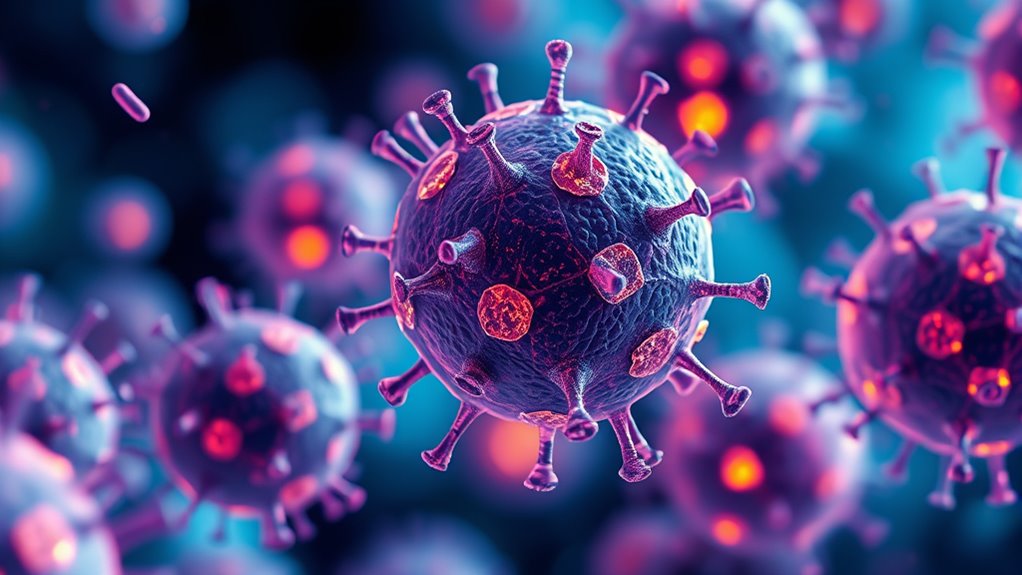Many common beliefs about boosting your immune system are myths. Herbs like echinacea or elderberry have only mild effects, and relying solely on them can give you a false sense of security. Instead, focus on proven habits like eating well, exercising, sleeping enough, and managing stress, which strengthen your defenses over time. Vaccinations are safe and protect against serious diseases, while avoiding infections through good hygiene. Keep exploring to discover the facts that truly support your immune health.
Key Takeaways
- Herbal remedies like echinacea or elderberry offer only mild immune support and are not a substitute for healthy habits.
- A strong immune system is built through balanced diet, regular exercise, adequate sleep, and stress management, not quick-fix solutions.
- Vaccines strengthen immunity by training the body to recognize pathogens; they do not weaken or harm the immune system.
- Catching colds or flu does not permanently boost immunity and can pose health risks; good hygiene and vaccines are safer defenses.
- Misinformation about immunity can lead to ineffective or harmful practices; rely on science-backed strategies for optimal immune health.

Have you ever wondered whether your immune system is stronger or weaker than you think? It’s a common question, especially with so much conflicting information floating around. Many people believe that taking certain herbal remedies can supercharge their immunity, but the truth isn’t always so simple. While some herbs like echinacea or elderberry may offer mild support, they won’t turn you into a superhero immune fortress. Instead, maintaining a healthy lifestyle—like eating well, exercising regularly, getting enough sleep, and managing stress—has a far more significant impact. Relying solely on herbal remedies might give you a false sense of security, making you overlook proven habits that bolster your immune defenses.
A healthy lifestyle beats herbal remedies for boosting your immune system.
Another widespread misconception involves vaccination myths. You might have heard that vaccines weaken your immune system or cause more harm than good. But that’s not how vaccines work. Vaccinations are one of the most effective tools we have to prevent serious diseases. They train your immune system to recognize and fight specific pathogens without causing the illness itself. Vaccines don’t weaken your immune system; instead, they strengthen it by preparing it for future encounters with dangerous viruses or bacteria. Believing these vaccination myths can make you hesitant or refuse immunizations, leaving you vulnerable to preventable illnesses. It’s essential to understand that vaccines are thoroughly tested for safety and efficacy, and they have saved millions of lives worldwide.
Many folks also think that catching a cold or the flu can somehow boost their immunity, but that’s a hazardous misconception. While mild infections can stimulate your immune system temporarily, they also come with risks of complications and severe illness. There’s no need to seek out infections to strengthen your defenses. Instead, focus on consistent, evidence-based practices. Proper hygiene, such as regular handwashing, reduces your chances of infection. Staying up-to-date with vaccinations, eating nutritious foods, and staying active all contribute to a resilient immune system. It’s about building a strong foundation rather than exposing yourself to unnecessary health risks.
In essence, understanding what genuinely supports your immune health is essential. Relying on false beliefs about herbal remedies and falling for vaccination myths can hinder your efforts to stay healthy. Your immune system is complex but manageable through proven strategies—balanced nutrition, good hygiene, regular exercise, and trusted medical interventions like vaccines. Don’t be swayed by misinformation; arm yourself with accurate knowledge to keep your defenses in top shape.
Frequently Asked Questions
Can Specific Foods Instantly Boost My Immune System?
You might hope that specific foods instantly boost your immune system, but that’s not how it works. Nutritional timing matters more—eating a balanced diet consistently supports your immune health over time. While some foods are known as immune boosters, their effects aren’t immediate. Instead, focus on regular, nutritious meals to strengthen your immune defenses gradually, rather than expecting instant results from particular foods.
Do Supplements Significantly Improve Immune Health?
Supplements can support your immune health, but they won’t dramatically boost it on their own. Focus on supplement safety by choosing reputable brands and consulting your healthcare provider. While some vitamins and minerals like vitamin C and zinc might help, they’re most effective when paired with a balanced diet and healthy habits. Remember, no supplement replaces good hygiene, sleep, and nutrition for maintaining a strong immune system.
Is Washing Hands Enough to Prevent All Illnesses?
Washing your hands is a powerful shield, but it’s not a magic wand that prevents all illnesses. Good hand hygiene definitely reduces disease transmission, yet it’s just one piece of the puzzle. To truly protect yourself, combine handwashing with other habits like avoiding touching your face and keeping surfaces clean. Think of it as a multi-layered defense, strengthening your overall disease prevention efforts.
Can Stress Directly Weaken My Immune Response?
You might wonder if stress impact can lead to immune suppression. The truth is, chronic stress can weaken your immune response by increasing cortisol levels, which suppress immune function. When you’re stressed for long periods, your body struggles to fight off illnesses effectively. So, managing stress isn’t just about feeling better mentally; it’s vital for maintaining a strong immune system and preventing immune suppression.
Are Vaccines Effective Against All Viruses?
Vaccine validity varies widely; they’re incredibly effective but not foolproof. You should understand that viral mutations can diminish vaccine effectiveness, making some viruses trickier to tackle. Vaccines substantially support herd immunity, helping protect those who can’t be vaccinated. While they may not combat every virus thoroughly, vaccines are an essential tool in preventing severe illness, controlling outbreaks, and curbing the spread of many infectious diseases.
Conclusion
Now that you know the truth behind common immune system myths, you can make better choices for your health. Remember, boosting your immune system isn’t about quick fixes or magic pills—it’s about consistent habits like good sleep, balanced nutrition, and regular activity. Did you know that around 70% of your immune cells are found in your gut? Taking care of your gut health can markedly strengthen your defenses and keep you healthier in the long run.









